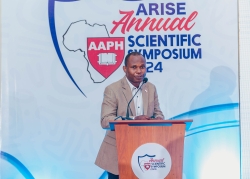
The project focuses on evaluating the effectiveness of Antenatal Multiple Micronutrient Supplementation (MMS) containing varying doses of iron in reducing maternal anaemia. Specifically, the project aims to assess the impact of MMS formulations with 60 mg or 45 mg of iron compared to the standard MMS containing 30 mg of iron on maternal anaemia during third trimester of pregnancy and other maternal and infant health indicators.
Key objectives include determining the superiority of MMS formulations with higher iron doses on maternal haemoglobin concentrations, evaluating the relative effects of iron dosage on secondary outcomes such as iron deficiency, anaemia, and foetal and infant health parameters, and assessing the side effects associated with different iron doses in MMS.
Achievements to date include the successful development of the study protocol, obtaining ethical approvals from relevant institutions, and the creation of an electronic data collection system. Challenges encountered include delays in obtaining stability data for investigational products, which are necessary for regulatory approval.
The project involves collaboration with esteemed institutions such as George Washington University, Harvard T.H. Chan School of Public Health, Columbia University, Ifakara Health Institute (IHI), and Muhimbili University of Health and Allied Sciences (MUHAS).
Future plans entail finalizing regulatory approvals, hiring research staff, conducting training, and initiating data collection at antenatal clinics in Dar es Salaam. The project aims to start data collection in the third quarter of 2024.
The ultimate impact of the project lies in its potential to inform policy decisions and national guidelines regarding the optimal iron supplementation dose for pregnant women, particularly in areas with a high burden of anaemia. By clarifying the effectiveness of different iron doses in MMS, the project seeks to contribute to the prevention of maternal anaemia and improvement of maternal and neonatal health outcomes in Tanzania.
